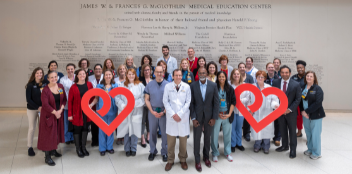A head start
New undergraduate research programs provide career-level experiences
Alexis Hawbaker’s desk is covered in sticky notes. A student at William & Mary, she labels herself a naturally curious person who jots down every great question that comes to her. “They just come to me out of nowhere, so I write them down and stick them there,” she said, intending to circle back to them. This year, she brought a few of those questions to Pauley, including one that reads: “Could the link between nerves, the extracellular matrix and myofilaments contribute to cell degeneration?”
Hawbaker is a participant in a new undergraduate program designed to provide students with career-forming experiences in multidisciplinary research. A collaboration between 
Designed for junior- or senior-level William & Mary students, REACH allows them to gain primary research experience in one of four fields of health-related science, all pertaining to diagnosis and treatment of cardiological diseases.
Majoring in kinesiology and health sciences, studying to become a physical therapist, Hawbaker says a course in cardiovascular physiology drew her to the idea of research. “I really fell in love with how much of an intersectional system it is and how it informs our daily functions.”
Through REACH, students are housed at VCU where they receive funded, full-time research positions under the supervision of a mentor. Hawbaker was paired with Fadi Salloum, Ph.D., the Natalie N. and John R. Congdon Sr. Endowed Chair at Pauley, for research that focuses on muscular dystrophy. Their sophomore year, students partner with mentors to produce grant-style proposals. Their junior year, students begin research. By their senior year, participants declare honor thesis plans, which they prepare and defend, before submitting and presenting to international audiences. By the time participants leave the program, they’re equipped with long-term, professional relationships and multiple publications.
“It’s not only exposing the students to clinical research, but also professional development.”
“It’s truly a gift to be given the opportunity to explore one meaningful, multifaceted question,” Hawbaker said. “It’s become so much more real to me. It’s not something abstract that we’re just looking into out of curiosity. There’s an urgency about our work.”
Now she’s considering a Ph.D., to marry physical therapy practice with research.
Meanwhile, the Pauley Heart Center Undergraduate Research Program, a 10-week research fellowship program funded through an institutional award by the American Heart Association, welcomes students from not just William & Mary, but any school, to experience research at VCU — one of just a handful of institutions nationwide to be selected to host. Despite COVID-19, both programs were able to stay on track in their first year, through a virtual research symposium.
Like REACH, the AHA-funded program pairs students with sponsor faculty members for a 10-week mentored research fellowship, providing them with experience to conduct translational, multidisciplinary cardiovascular research. Open to full-time undergraduate students classified as juniors or seniors, applicants undergo initial interviews and submit project proposals to the director of Pauley, competing for funds — including a stipend plus cost of housing. Over the course of their experiences, students participating in the AHA-funded program are also required to submit narratives and annual updates to the association.
“It’s not only exposing the students to clinical research, but also professional development,” says Megan O’Hare, program manager.
“We’re participating in the things that researchers do on a day-to-day basis in their lives, as well as educating our fellow classmates,” said Anuj Kotak, a third-year biomedical engineering and psychology student at VCU who participated in the inaugural program. “For those of us going into cardiology as physicians, or conducting research, these are skills that we’ll be using for the rest of our lives.”
For his research, Kotak was paired with Dr. Cory Trankle, instructor for the Department of Internal Medicine’s Division of Cardiology. “The work I did with Dr. Trankle — only one other hospital in the nation is working on that type of research, so I felt like this was an opportunity to participate in something that could have a lasting impact on the field,” he said. “That’s why I found this program so exciting … I thought that it would be impossible to do at the undergraduate level. It has solidified my plan to become a cardiologist.”
Back to Autumn-2020
Join our Pauley Consortium composed of patients, friends and advocates.

